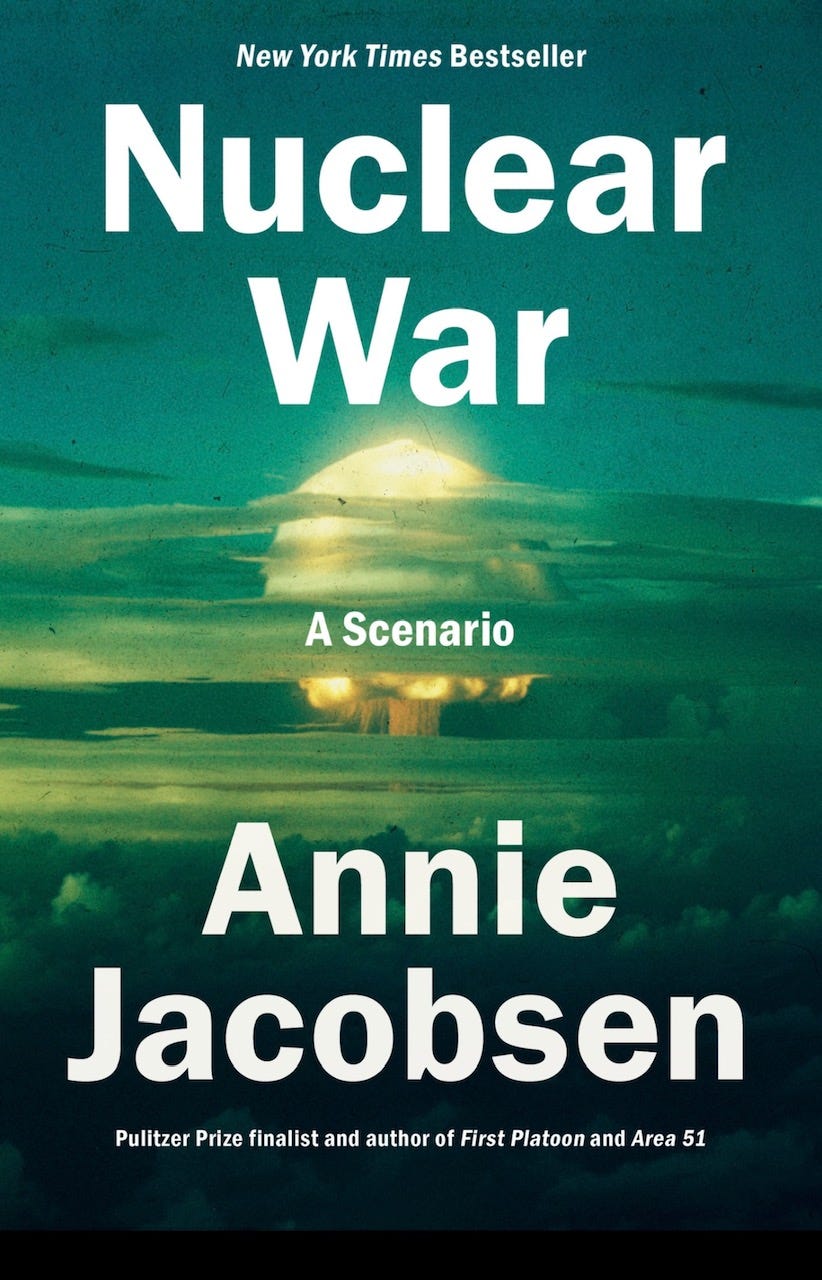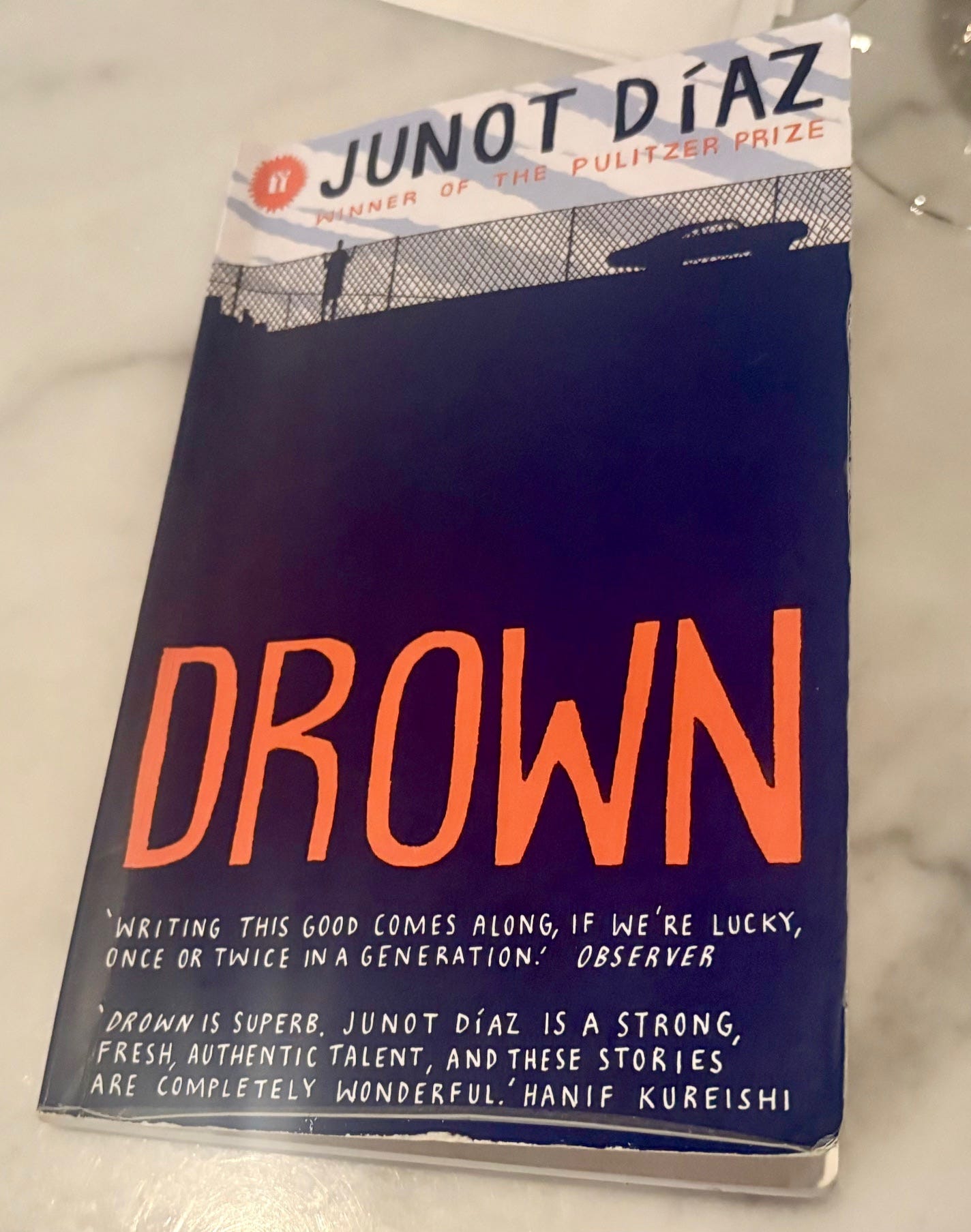five top things i’ve been reading (twenty-third edition)
the latest in a regular 'top 5' series
Nuclear War: A Scenario, Annie Jacobsen
Drown, Junot Diaz
Who Would Choose Socialism? Robert Nozick
Why I Debated Curtis Yarvin at Harvard, Danielle Allen
Mahler Symphony No.6, National Symphony Orchestra, conducted by Gianandrea Noseda, Kennedy Center
This is the twenty-third in a weekly series. As with previous editions, I’ll move beyond things I’ve been reading, toward the end.
1) This week, I read a book that opens with the instantaneous incineration of Arlington, Virginia — the place where I now live. Yes, I finally got round to reading Nuclear War: A Scenario (2024), by the investigative journalist Annie Jacobsen. Since you already know the title of this book, it’s not much of a spoiler to tell you it contains the story of a possible route to nuclear armageddon. Nonetheless, I won’t reveal the narrative of this story, which draws on years of interviews Jacobsen carried out. Rather, I’ll focus on the warning she uses it to send.
First, I’ll admit that reading Jacobsen’s book has convinced me that I’ve considerably reduced my chances of living forever by choosing to live two miles from the Pentagon.1 Reading it hasn’t made me want to move further away, however (I love this area). Nor has it left me seeking dark solace in the knowledge that a nuclear attack would likely be over for me before I knew it. Rather, reading Jacobsen has reinforced my strong belief — which I wrote about here a few months back — that there’s vastly more we should be doing to prevent a nuclear war from happening in the first place.
In my piece, I argued that serious financial and intellectual capital should be urgently committed to finding innovative technological solutions to take the place of nuclear deterrence. Indeed, I argued that nuclear deterrence isn’t a solution, at all. Rather, it’s a morally bankrupt placeholder approach, which depends, as I wrote, on “persistently threatening to literally pulverise human beings in the name of saving humankind”, while “creating, or at least failing to stop, a race to the biggest possible nuclear arsenal”.
To this, Jacobsen adds the suggestion that depending on deterrence to try to prevent nuclear war might come at the insane cost of effectively preventing us from being able to end such a war. She tells us that whenever a nuclear attack is gamed out under current conditions, it catastrophically escalates. She describes the weaknesses of current defensive systems, none of which seem anywhere near capable of reliably blocking a barrage of missiles. Most of all, however, she repeatedly emphasises the horrible truth that as soon as a ballistic nuclear weapon is on its way — an ICBM launched from the ground, or an SLBM launched from the sea — its sender cannot change their mind and retract it. Did you know that?
Jacobsen suggests that even Reagan wasn’t sure about this! That, “at a press conference in 1982, [he] went so far as to incorrectly tell the public that ‘submarine ballistic missiles are recallable’”. Now, of course, if all you care about is deterrence, then making nuclear weapons unrecallable might make sense. But only caring about deterrence is a pretty hard position to sell! So maybe it wasn't that Reagan didn’t know about the constraint on recalling nuclear missiles. Maybe he didn't want the public to know about this, instead.
Jacobsen makes it clear that nuclear war would also be a top-down matter. If deterrence were to fail, she tells us, the focus of government decision-makers would quickly turn away from members of the public, many of whom would be assumed past saving. Instead, the sole goal would become to protect the chain of succession — even if just to try to ensure that someone would be around to authorise the sending of the final missile.
We shouldn’t assume this new focus would be laser sharp, however. At an early point in Jacobsen’s scenario, we see senior U.S. figures wasting vital minutes shouting at each other about who gets assigned a parachute on the President’s escape plane. But Jacobsen also reveals the scale of the planning that goes on to try to avoid such time-wasting. We learn about endless ‘worst-case-scenario’ drills, acted out across the world, by officials of varying ranks, day in day out, in the hope of making them behave like automatons if the worst ever happened. What a waste. What a life. A global industry based on trying to ensure that if someone were to launch a nuclear missile at you, then you'd make yourself launch one back in return before you died, even though you knew that doing so would play a part in killing millions.
Let's pause a second, however. For all Jacobsen seems convinced that there’s only one realistic outcome after the first missile has been fired, and for all it seems that deterrence helps to stack the odds this way, it’s important to remember the future isn’t fixed. Perhaps, in the real world, someone would refuse to return fire, and perhaps this would prevent armageddon, and perhaps it would finally convince everyone to disarm! Or perhaps there are better defensive systems in place than Jacobsen believes. Or perhaps there's a God out there, somewhere, who'd step in to save us all. My instinct here — excepting the deus ex machina option — is to be more optimistic than Jacobsen. But while being optimistic usually serves me well, I think I should fight against it this time. I think we should all fight against the failure of humankind to deal with the nuclear threat.
That is, I’d have preferred to read a book involving a hypothetical nuclear scenario that developed in a more nuanced way. Particularly, I’d have preferred to read a book that showed leaders acting as humans: a book acknowledging and modelling the chance that they might. Minimally, however, Jacobsen’s book provides sufficient reason — as I think do the arguments in my piece — to rethink the global approach to preventing accidental nuclear war.
After all, whether you’re generally optimistic about human nature, or whether you buy the value of deterrence, an accidental nuclear war seems much more likely than an intentional one. Bearing this in mind, it becomes less frustrating that we never find out why the first missile was launched in the Jacobsen scenario. Late on in the book, she strongly implies it was an act of crazed vengefulness. But an important point she might be making, in keeping this a secret, is that nuclear war need not be intentional. This holds for both madness and accident. And the risk of either is problematic for a prevention method based on predicting the behaviours of reasoning actors.
If therefore, as Jacobsen tells us, Russia lacks the technical capacity to put in place a satisfactory system for distinguishing between incoming nuclear missiles and false alarms, then countries with that capacity should share it. And if, as Jacobsen suggests, “almost all U.S. presidents since John F. Kennedy” have been “entirely underinformed about how to wage nuclear war when it happens”, then this should change, not least so presidents can push back against bad expectations. Most of all, however, we should seek a proper solution to ending the threat of nuclear war: a technological solution that would make nuclear weapons impotent. We don’t have to live like this.
2) When I first read Junot Diaz’s short story collection Drown (1996), I didn’t like it as much as his other short story collection, This Is How You Lose Her, or his novel, The Brief Wondrous Life of Oscar Wao. I think that’s still my view. But reading Drown again this week reminded me how very relative a view it is. He’s a great writer!
The stories in Drown are full of the same themes as Diaz’s other books: nationality, immigration, longing, drugs and sex as escape, food as comfort, and violence. The first story in this collection, Ysrael, was the one that had remained with me the most clearly. Yet its ending — with the shock of the force Diaz describes in a fight between boys — still hit hard. Surely he’s one of the best fiction writers of our time.
3) I also returned this week to Who Would Choose Socialism?, a short essay Robert Nozick wrote for Reason in 1978. Here, Nozick argues that the Israeli kibbutz is the best test of demand for socialism, because the status that kibbutz life holds in Israel, as a valuable and respected alternative to non-socialist living, means that the “major reason for an Israeli's not living in a kibbutz is that he just doesn't want to live that way”. Nozick concludes, nonetheless, that the most expansive answer the Israeli kibbutz offers to his title question is nine per cent of people.
Various obvious questions arise about the premises and methodology Nozick embraces in this short but big-claiming essay, not least: Does kibbutz life neatly equate to socialism? What about the wannabe kibbutz-livers or non-kibbutz-livers who allow their lifestyle preferences to be overridden by the preferences of their partners or wider families? What if technology vastly decreased scarcity of goods? What if other conditions substantially changed?
Nozick addresses some of these questions. But the main value of this essay lies not in any empirical claim or result. Rather, it corroborates one of the most memorable conclusions of Anarchy, State, and Utopia: that Nozick, the property-rights guy, believes in such a thing as a socialist utopia. Indeed, he stresses in the Reason piece that the socialist “minority should everywhere be allowed to [join] together with other like-minded people to live according to their desires”. Of course, it’s clear within ASU that Nozick holds such beliefs, but try telling that to some of his critics (and some of his fans).
4) I was glad to read this Danielle Allen piece, in the WSJ, about the public debate she recently had with the blogger Curtis Yarvin. I don’t know much about Yarvin, but I know he’s an authoritarian whose facility with words has helped him gain influence and followers. Allen mentions early on in the piece that her students had “asked me to debate him” — a comment surely intended in part to provide some insurance against criticism of the kind she faced from ‘no-platformers’ before the debate.
For too long, many academics have given in to such criticism; they’ve failed in their obligations to use their privileged positions as public thinkers to take on bad ideas in public. Extra obligations of this kind are held by academics, like Allen, who work on political matters. But if Allen’s public debating was as strong as this piece of public writing, then I bet she did well against Yarvin.
From what Allen writes, I take it that, aside from holding noxious views about race, Yarvin is an unreconstructed Hobbesian: someone who thinks the only way we can stop ourselves from killing each other is by surrendering to an uncheckable strong-man leader. Old idea, new proponent, persistent threat.
5) On Saturday night, I went to Mahler six at the Kennedy Center. I’m never going to like six as much as five, but it was such great playing from the NSO...









